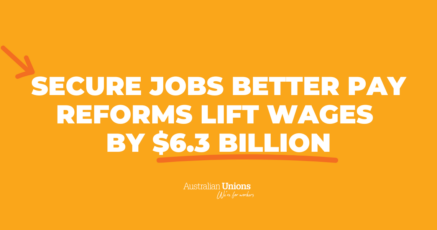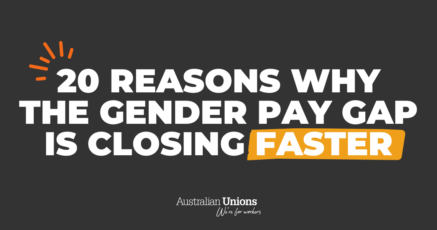You take a nap so it’s easier to skip a meal. You time your washing loads for the off-peak energy period. You stop going to the doctor – and not by choice.
For workers who rely on minimum wages, the sheer cost of living doesn’t mean missing out on takeaway coffee or streaming services. Those things are already long gone. It means cutting back on basic needs because there’s nothing else left to cut.
There are two words workers in this situation need to hear: Pay. Rise.
Sign our petition asking for a 7% increase to the minimum wage
How do minimum wage increases happen?
If your wage is set by an Award or the national minimum wage, any increase to your pay happens through the Annual Wage Review. If you’re not sure if that’s you, these tips will help you find out.
Each year the Fair Work Commission (FWC) – Australia’s independent tribunal for workplace relations – sets the new minimum wage and Award wages. The final change comes into effect on 1 July each year.
There are two types of minimum wages that are set by the Annual Wage Review:
- Award wages – if you are employed under an Award at your workplace (check your employment contract if you’re not sure), these changes will affect you.
- The national minimum wage – if you’re an employee who isn’t covered by either an enterprise agreement or an Award, you cannot be paid below the national minimum wage.
Note: If you have a collective agreement (also often called an enterprise agreement) then your wages will be set by that agreement, not by the Annual Wage Review.
The current national minimum wage for 2022/23 is $21.38 per hour.
With every Annual Wage Review, unions make submissions to the FWC. These union submissions are basically arguments to the FWC to support a meaningful increase for around one in four workers in Australia who will be impacted by the decision.
But unions aren’t the only one who make submissions.
Big business groups too and they have a track record for supporting little to no wage increases.
Why workers need a seven per cent increase
On average, you are paying seven per cent more for everyday items and services. That looks like skyrocketing rents, grocers, clothing, fuel and childcare.
To literally afford to live – hence the term ‘cost-of-living’ – your wage increase really needs to at least match that number. Anything below that means you have experienced a pay cut.
Union members are calling on the FWC for a seven per cent pay rise in 2023 because working people need a lifeline.
The workers whose pay changes with the Annual Wage Review are the workers who deliver vital services: nurses, aged care workers, early childhood educators, fast food employees, cleaners, disability carers, and retail workers. However, almost every industry has its own Award, that is impacted by the Annual Wage Review.
Business profits show that they can afford a seven per cent increase. For the lowest paid workers in this country, it’s a matter of survival.
We won a record-breaking increase of 5.2 per cent last year and we can do it again.






SHARE:
Why a 7% increase to the minimum wage is a matter of survival